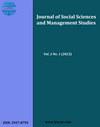Water Demand among Hostel Residents in Tertiary Institutions in Calabar, Cross River State, Nigeria
引用次数: 1
Abstract
Water is life and living things depend on it for survival. The role water in determining survival has made it remain an inevitable commodity. At the household level, water is needed for several reasons including personal hygiene, food preparation, laundry and drinking Occupants of hostels in tertiary institutions demand water for the reasons listed above and more hence, the study focused on analysing water demand among hostel occupants in tertiary institutions in Calabar, Nigeria. The study relied on questionnaire in order to obtain data. A total of 400 copies of questionnaire were distribute. Data were further analysed using various statistical approaches such as means, modes, and Pearson product moment correlation based on statistical package for social sciences. The results showed a strong positive relationship between water demand and supply. In other words, it was observed that water consumption is influenced by supply. Equally, the determinants of water demand were observed. It was identified that environmental factors, source of water, population among others influence water consumption. Based on the findings of the study, it was suggested that access to water be improved especially as students in tertiary institutions are likely to increase. Equally, attempts should be made to provide water more frequently for use by the students in the residential halls. Keywords: Residential hostels, source of water, traveling distance, water consumption, quantity/quality of water尼日利亚克罗斯河州卡拉巴尔大专院校宿舍居民的用水需求
水是生命,所有生物都依赖它生存。水在决定人类生存方面的作用使它仍然是一种不可避免的商品。在家庭层面,需要水的原因有几个,包括个人卫生、准备食物、洗衣和饮水。大专院校宿舍的住客因上述原因需要水,因此,本研究的重点是分析尼日利亚卡拉巴尔大专院校宿舍住客的用水需求。本研究采用问卷调查的方式来获取数据。共分发了400份调查表。数据进一步分析使用各种统计方法,如均值,模式和皮尔逊积差相关基于统计软件包的社会科学。结果表明,水的需求和供应之间存在很强的正相关关系。换句话说,人们观察到水的消耗受到供应的影响。同样,还观察了需水量的决定因素。经查明,环境因素、水源、人口等因素影响着水的消耗。根据这项研究的结果,有人建议,特别是在高等教育机构的学生可能增加的情况下,应改善获得水的机会。同样,应该尝试更频繁地提供水供学生在宿舍使用。关键词:宿舍楼,水源,出行距离,用水量,水量/水质
本文章由计算机程序翻译,如有差异,请以英文原文为准。
求助全文
约1分钟内获得全文
求助全文
来源期刊

Journal of Social Sciences and Management Studies
Social Sciences and Management Studies-
自引率
0.00%
发文量
0
期刊介绍:
Journal of Social Sciences and Management Studies (ISSN: 2957-8795) is a peer reviewed journal focuses on integrating theory, research and practice in the area of management and social sciences. The journal discusses the distinctive disciplinary practices within the sciences of the management and social field and examines examples of these practices. In order to define and exemplify disciplinarity, the journal fosters dialogue ranging from the broad and speculative to the microcosmic and empirical. In considering the varied interdisciplinary, trans-disciplinary or multidisciplinary work across and between the social, natural and applied sciences, the journal showcases interdisciplinary practices in action. The focus of papers ranges from the finely grained and empirical, to wide-ranging multi-disciplinary and transdisciplinary practices, to perspectives on knowledge and method.
 求助内容:
求助内容: 应助结果提醒方式:
应助结果提醒方式:


